10 Green Smoothies (and 8 Foods) to Help You Ease Seasonal Sadness

Every year around the change of the seasons, many people experience a big shift in their happiness and well-being. And not for the better!
I get it. I live in a ski town, where it’s bitter cold six months of the year! Are you happier in the sun, and do you get into a slump in the winter? You’re not alone.
This slump is known as Seasonal Affective Disorder, somewhat appropriately abbreviated SAD. SAD typically creeps in around Daylight Savings Time or towards the end of the year, when the days get shorter and there’s less natural light.
Does this sound like it might be you? Read on to learn more about this common occurrence and how you can best approach this dark time of year.
Even though a lack of sunshine is the cause, you can actually employ some nutrition strategies that really do help!
In This Article
- What Is Seasonal Affective Disorder?
- Ways to Combat Seasonal Affective Disorder Naturally
- Best Foods for Seasonal Affective Disorder
- Green Smoothie Recipes for Seasonal Affective Disorder
What is Seasonal Affective Disorder?
Seasonal Affective Disorder is a form of depression. It’s more predictable than the classic type of depression because it happens around the same time every year, most often in the fall and winter.

Symptoms can include the following:
- Feeling depressed
- Low energy
- Change in appetite
- Difficulty sleeping
- Loss of interest in activities you’ve enjoyed
- Rapid weight loss or gain
- Fatigue
- Brain fog
- Suicidal thoughts
The Mayo Clinic notes that there are winter-specific SAD symptoms as well, such as sleeping too much, carb cravings, weight gain, and low energy. Spring and summer-specific symptoms may include insomnia, low appetite, weight loss, or anxiety1.
The SAD season doesn’t have to be an inevitable part of the year that you just slog through. Especially in parts of the world where winter seems to last forever, that can be a large chunk of the year that you try to power through low mood and energy! What’s more tiring than that?
Ways to Combat Seasonal Affective Disorder Naturally
Instead of suffering through the darker months of the year, there are various therapies that people with SAD use.

- Light therapy: This is a very common tool that those suffering from SAD use. Since we don’t get a lot of natural light in fall and winter, Vitamin D levels can get low, which can lead to depression2. You can purchase a light box that you turn on when you wake up so that you’re exposed to bright light first thing in the morning. Light boxes are designed to have the effect that natural light from the outdoors would have on your body and brain3. There are several types of light boxes out there, ranging in price from $30 to $100 or so. There are also specialized red-light therapy devices that address SAD and promise several other health benefits. Have a conversation with your functional medical practitioner to see if they recommend a specific product and if they have recommendations on when to use this therapy.
- Talk therapy: While many people opt for antidepressants to combat SAD, if you want to go a more natural route, try talk therapy first. Your practitioner can help you understand and learn how to cope with SAD and manage your symptoms.
- Meditation: Allowing yourself some time in the morning to meditate, even for just 5-10 minutes, can help you tackle the day in a whole different way. Breathing deeply activates the parasympathetic nervous system, which helps calm and relax our bodies. Reduced stress can help improve mood.
- Mood-boosting foods: Taking care of our bodies from the inside out can help get to the root of the problem. We want to add in foods that have mood-boosting qualities so we can combat SAD on a cellular level. Look for foods that increase energy, improve gut health (because that’s where 90% of serotonin is made4), and support your hormones.
[Related: How To Beat Winter Blues]
Best Foods for Seasonal Affective Disorder
- Nuts and seeds: Opt for varieties rich in omega 3 essential fatty acids, like flaxseed (sprouted is even better) and walnuts. Folks who eat more of these report fewer depression symptoms and a more positive outlook5.
- Mushrooms: If you’re not able to get outside for your Vitamin D, there are a few food sources that can help. Mushrooms are a good source of the “sunshine vitamin.” They may not work in all applications, but for things like smoothies, consider getting them in powder form. You can usually find adaptogenic mushrooms like chaga and reishi in this form. They’re also available as “coffee” from a few different brands now, which can be used as a smoothie base (I’d put it with more chocolatey smoothies).
- Dark chocolate: Speaking of chocolate, studies show that its polyphenols (aka antioxidants) can significantly improve mood6. No wonder we always want chocolate when we’re feeling down!
- Bananas: Tryptophan is an amino acid that is converted into serotonin (aka the hormone that makes us happy), and you can get it from more than just turkey! Bananas are a good source as well.
- Spinach: Leafy greens are great sources of B vitamins, which are vital for our mood levels. Spinach in particular is high in B6, which is what our bodies need to make that conversion from tryptophan to serotonin. You can also get B6 from some of the foods I already mentioned, like walnuts and sunflower seeds.
- Avocados: These creamy fruits have both tryptophan and B6. Avocados also have plenty of “good” fat, which will provide you with longer lasting energy from one meal to the next. More energy will give you more motivation throughout the day.
- Coconut: This is another great source of healthy fats. Fat helps keep blood sugar stable, and that means more even-keeled mood and better hormone balance. Coconut’s fat, medium-chain triglycerides, burns more quickly than other types of fat, meaning your body can use it for energy more quickly, too. A great fuel source when you’re feeling fatigued.
- Fermented foods: We don’t often think about how things are connected in our bodies. There is an important link between the gut and the brain that is affected when there’s an imbalance in our digestive system7. So it’s important that we take care of the digestive tract with probiotic-rich foods. Probiotics are healthy bacteria that keep the gut strong, and thriving gut health can bring us thriving mental health, too.
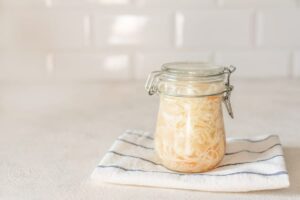
[Related: 14 Ways I Optimize My Health And Energy Every Day]
Green Smoothie Recipes for Seasonal Affective Disorder
1. Chocolate Goji Smoothie
(Adapted from 101 Healthy Lunch Ideas)
Cacao powder will have the most benefits of any chocolate product because it has the highest concentration of antioxidants, giving you lots of the mood-boosting polyphenols I mentioned above. Make sure what you’re buying is raw; heat-processed versions lose their healthful benefits because they get denatured with high heat.
Ingredients
- 1 cup young Thai coconut liquid
- ½ cup young Thai coconut meat
- ¼ cup goji berries (if dried, preferably soaked in the coconut liquid for 30 mins)
- 3 tbsp raw cacao powder
- ½ cup frozen raspberries
- 1 tbsp honey or maple syrup (plus more, to taste)
- Ice (enough to achieve desired consistency)
Directions
Place all ingredients in a high-powered blender and puree until smooth.
2. Morning Berry Bliss
(From Readers’ Favorite Recipes: Volume 1)
This breakfast smoothie features coconut yogurt, but whatever dairy-free option you use, make sure it’s cultured; this means there are probiotics in the final product that are helpful for gut health. Also, if you don’t have any protein powder available, you can substitute it with chia or flax seeds, or a mix of both. These both contain the omega-3 fatty acids that help elevate your mood.
Ingredients
- ½ cup cultured coconut yogurt
- ⅓ cup coconut, almond, or rice milk
- 1 tbsp sprouted flaxseed
- 1 scoop vanilla protein powder
- 1 cup packed organic spinach
- 1 cup frozen mixed berries
Directions
Blend all ingredients together except for the frozen mixed berries and mix well. After everything is well-incorporated, add the berries and blend until smooth.
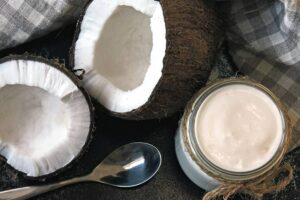
3. Chard Strawbana Smoothie
(From Readers’ Favorite Recipes: Volume 1)
This is a super-tasty smoothie that lets the strawberry flavor shine. Strawberries are low on the glycemic index, which means they won’t spike your blood sugar. Balanced blood sugar brings you a balanced mood, and the fat and protein in the flax and pumpkin seeds help out on this front too. Bananas offer the serotonin-producing tryptophan that we need for a little more optimism in our day.
Ingredients
2 cups water
2 tbsp flax seeds
2 tbsp pumpkin seeds
2 pitted medjool dates
4-6 swiss chard leaves
Spinach, added until you reach the 4-cup line
2 bananas
14 frozen strawberries
Directions
Soak the flax seeds, pumpkin seeds, and dates in the water for about 10 minutes. Blend the seeds, dates, and water with chard, then add spinach until the blended volume is 4 cups. Add bananas and frozen strawberries and blend until smooth.
4. Greena Colada
(Adapted from Readers’ Favorite Recipes: Volume 1)
This recipe originally only used a water base, and it will work perfectly fine that way, but to make it more SAD-friendly, I recommend going for coconut water kefir. Kefir is a probiotic beverage, so we can take advantage of its benefits for gut health. And remember, a happy gut is a happy brain! If you can’t find this in a store, you can easily make it yourself.
Ingredients
- 2 cups spinach
- 2 cups unsweetened almond milk or coconut milk
- 1 cup raw coconut (dried or young fresh)
- 1 ½ cups frozen pineapple OR 1 cup fresh pineapple + 2 cups ice cubes
- Coconut water kefir, to desired thickness
Directions
Place all ingredients in a high-powered blender and puree until smooth.
5. Fruity Green Cacao
(Adapted from Readers’ Favorite Recipes: Volume 1)
You may be wondering how mesquite fits in here — isn’t that for the barbecue? A common misconception! While the wood of the mesquite tree is used for smoking meats, the fruit (pods) are often ground into a powder that can be used as a natural sweetener. It has a nice caramel taste that works well with the cacao and fruit in this recipe. Its low-glycemic blood-sugar balancing properties help keep mood swings at bay.

Ingredients
2-3 cups fresh greens (spinach or baby romaine work nicely)
1 cup light coconut milk (in the can)
1 banan
½ - 1 cup frozen blueberries
½ - 1 cup water
1 scoop greens powder
1 heaping tbsp raw cacao powder
1 tsp mesquite
Your favorite sweetener, to taste
Pinch of salt, optional
Directions
Place all ingredients in a high-powered blender and puree until smooth.
6. Holiday Green Smoothie
(From Healthy Holiday Favorites)
This seasonal smoothie is a Vitamin B6 cocktail! It’s an excellent source of the serotonin booster, thanks to the greens, avocado, chia seeds, and yummy persimmons. I love this smoothie during the holiday season. It has a bonus boost of Vitamin C, which not only helps out our immune system, but also supports our adrenal and mental health.
Ingredients
- 2 cups spinach
- 2 cups kale
- 4 persimmons
- 1-2 frozen bananas
- 2 cups almond milk
- ½ cup plain kefir
- ½ avocado
- 1 tbsp chia seeds
- 1-3 tsp honey or maple syrup, optional
Directions
Place all ingredients in a high-powered blender and puree until smooth.
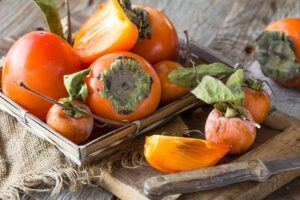
7. Robyn’s Green Smoothie
(Adapted from Robyn’s Healthy Family Favorites)
My classic green smoothie is full of B vitamins, and is also a great source of calcium. Did you know kale has more calcium than dairy? When you fill up the blender with this leafy green, or a mix of your favorites, you’ll be supporting your nervous system and decreasing the risk of depression (which is a known symptom of calcium deficiency8). This is a big smoothie, and you can change the ratios of vegetables to fruit depending on where you are in your smoothie journey. For newbies, you’ll want more fruit than greens until you start developing a taste for the less-sweet variety. Add in organic sprouted flax for mood-boosting omega 3s.
Ingredients
- 2 cups water, plus more if needed for consistency
- ¼ whole lemon, including peel
- ¾ - 1 lb greens (your choice of spinach, chard, kale, arugula, etc.)
- 1-2 cups frozen mixed berries
- 1-2 bananas
- 2 tbsp sprouted flax, optional
- 1 tsp stevia, optional
Directions
Blend water with lemon first to ensure the peel breaks down; if you don’t have a high-powered blender, this may take a few minutes. Add in greens and briefly puree as you add, continuing until the mixture reaches the 5-cup line, then puree the mixture until very smooth. Add in remaining ingredients, then blend for about 90 seconds or until mixture is smooth.
8. Aloe and Apple Smoothie
(From The Green Smoothies Diet)
Aloe is a highly nutritious plant food. It’s rich in a broad spectrum of vitamins and minerals that support your overall wellness, along with enzymes that help your digestion. It’s also very soothing to the GI tract, so if you are experiencing any gut issues with SAD, this will be a healing smoothie to enjoy. Just make sure you’re getting it straight from the aloe plant (and using only the clear gel, not the leaf) or from a quality, food-grade source. We don’t want the kind you get at the drugstore for sunburns!
Ingredients
- 2 ¾ cup water/ice
- 2 large spears of fresh aloe vera, cut from the plant (or ¼ cup bottled)
- 4 large collard leaves
- Spinach, added until mixture reaches 6-cup line
- 1-2 inches fresh ginger, peeled
- 2 large Granny Smith apples
- 2 bananas, frozen in chunks
- 3 cups frozen blueberries
- ½ tsp stevia
Directions
Blend first four ingredients until smooth. Add fruit and stevia and blend until smooth. Serve immediately for best results, or refrigerate for up to 24 hours in glass jars and shake well before serving.
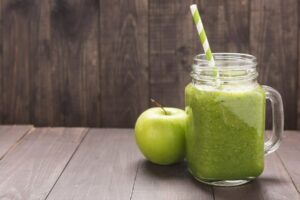
9. Cranapple Yogurt Crave
(Adapted from The Green Smoothies Diet)
You may be wondering about the sugar in this smoothie, with the fruit and honey in the mix. We don’t have to worry about sugars from whole fruits, because they come naturally packaged with fiber that helps keep your blood sugar from soaring. Honey, however, needs something to slow the release of its sugars into the bloodstream so your mood isn’t messed with in the process. This is why I like to make sure the yogurt I use is full-fat. Fat is also necessary for supporting our brain health, since that’s what 60% of our brain9 is made up of!
Ingredients
- 2 ½ cups water/ice
- 1 cup cultured coconut yogurt
- 2 leaves swiss chard, including stems
- 2 leaves collard greens, including stems
- Spinach, added until mixture reaches 6.5-cup line
- ½ cup raw, local honey or maple syrup
- 2 cups cranberries
- 2 cups blueberries
- 1 banana, frozen in chunks
- 3 Cameo apples
Directions
Blend first six ingredients until smooth. Add remaining ingredients and blend again until smooth. Serve immediately for best results, or refrigerate for up to 24 hours in glass jars and shake well before serving.
10. Latin Green Smoothie
(Adapted from The Green Smoothies Diet)
No matter the time of year, when you sip this smoothie, you’ll be transported to the beach! Turn on your light box and close your eyes while you enjoy the summery flavors of cilantro, lime, and fresh fruit. Cayenne gives this drink a spicy kick, while the spinach and bananas bring the mental health supporting tryptophan into the mix.
Ingredients
- 3 cups water
- ½ bunch cilantro
- 2 inches fresh ginger, peeled
- ½ tsp cayenne pepper
- ¼ cup honey or maple syrup
- Spinach and/or collards, added until mixture reaches 6-cup line
- 2 star fruit, coarsley chopped
- ½ unpeeled lime, washed and quartered
- 2 bananas, frozen in chunks
- 2 pears or apples
- 2 cups frozen mixed berries
Directions
Blend first six ingredients until smooth. Add remaining ingredients and blend again until smooth. Serve immediately for best results, or refrigerate for up to 24 hours in glass jars and shake well before serving.
Read Next: How To Beat Winter Blues

Disclosure: This post may contain affiliate links that help support the GSG mission without costing you extra. I recommend only companies and products that I use myself.
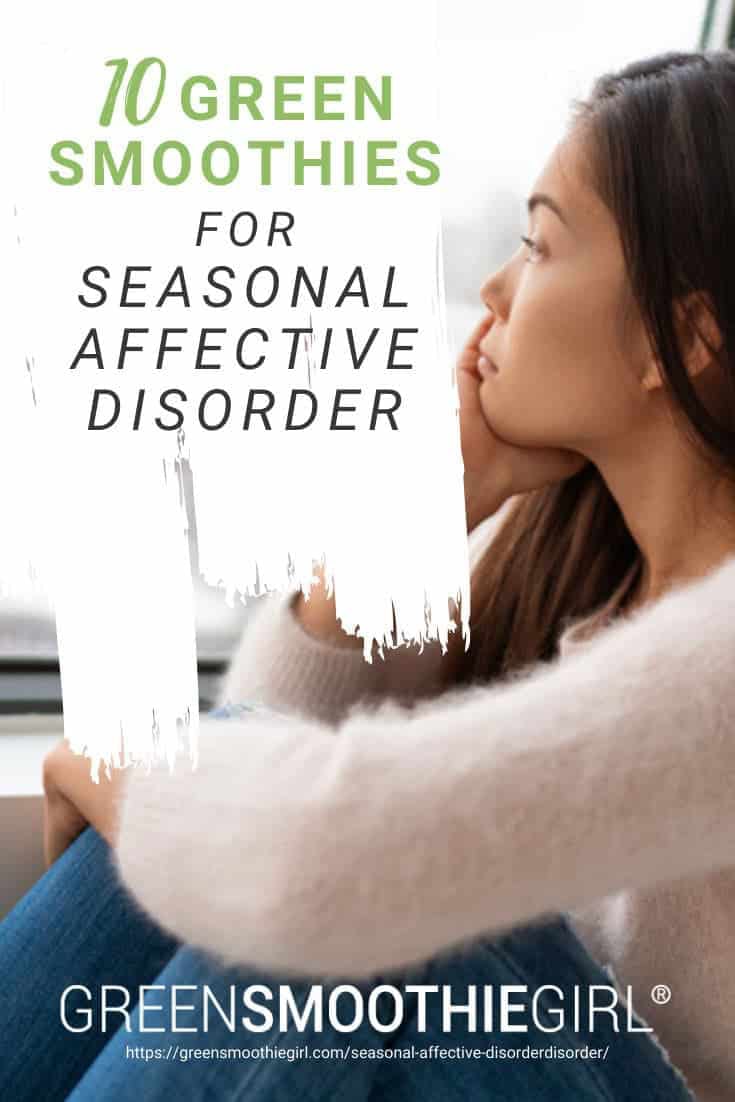
Resources
- “Seasonal affective disorder (SAD).” The Mayo Clinic. October 25, 2017.
- Penckofer, S. et al. “Vitamin D and Depression: Where Is All the Sunshine?” Issues in Mental Health Nursing. 2010 Jun; 31(6): 385–393. doi: 10.3109/01612840903437657
- Melrose, S. “Seasonal Affective Disorder: An Overview of Assessment and Treatment Approaches.” Depression Research and Treatment. 2015; 2015: 178564. Published online 2015 Nov 25. doi: 10.1155/2015/178564
- Stoller-Conrad, J. “Microbes Help Produce Serotonin in Gut.” Caltech. April 9, 2015.
- “Omega 3 Fatty Acids Influence Mood, Impulsivity And Personality, Study Indicates.” University of Pittsburgh Medical Center. ScienceDaily. March 4, 2006.
- Pase, M.P. et al. “Cocoa polyphenols enhance positive mood states but not cognitive performance: a randomized, placebo-controlled trial.” Journal of Psychopharmacology. January 29, 2013
- “The gut-brain connection.” Healthbeat. Harvard Health Publishing.
- Lewis, J.L. “Hypocalcemia.” Merck Manuals: Professional Edition. Last full review/revision March 2018.
- Chang, C.Y. et al. “Essential fatty acids and human brain.” Acta Neurologica Taiwanica. 2009 Dec;18(4):231-41.
Posted in: Emotional Health, Green Smoothies, Health Concerns, Mind/Body Connection, Recipes
















